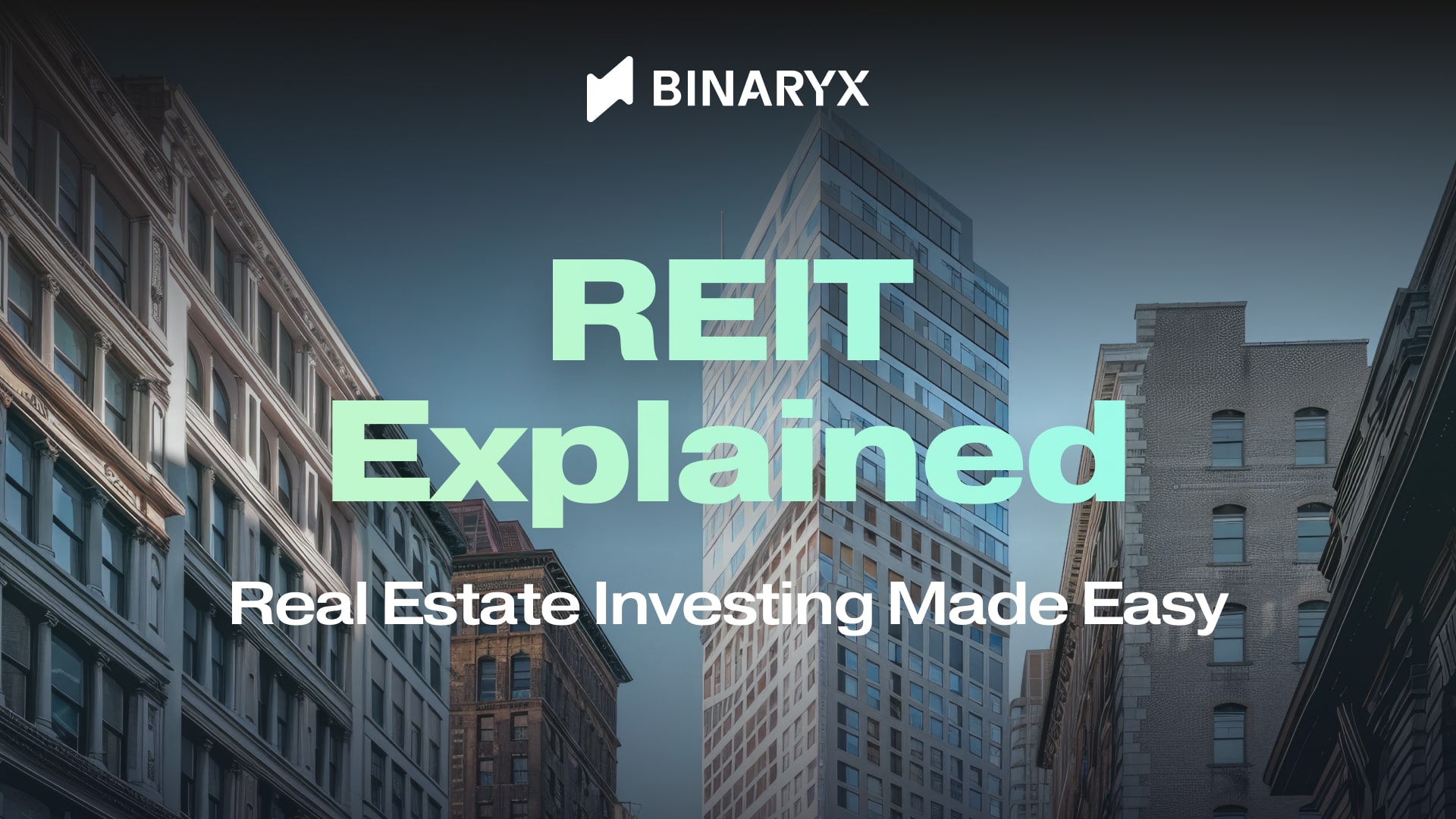Real Estate Investment Trusts (REITs) have become a go-to option for people wanting to invest in real estate without actually buying property. They offer a simple way to earn a steady income, thanks to their regular dividend payouts. With REITs, you can invest in everything from shopping centers to office buildings, all without the headaches of managing tenants or dealing with maintenance. Cool, right? Want to know how to do that properly? Here is an article for you.
What are Real Estate Investment Trusts (REITs)?
A Real Estate Investment Trust, or REIT, is essentially a company that owns or finances income-producing real estate. Instead of buying property directly, investors can buy shares in a REIT, much like they would with any stock. These trusts collect rent from tenants, and then, by law, must pay out 90% of their taxable income as dividends to shareholders.
What makes REITs interesting is how they open up real estate investment to everyone. You don’t need to be a millionaire or a property mogul to get involved. With a REIT, you can own a piece of shopping malls, office buildings, or apartment complexes simply by purchasing shares. It’s real estate investing, but without the heavy lifting.
How REITs Operate and Make Money?
At their core, REITs are companies that let everyday investors pool their money to own shares of large real estate portfolios. Instead of buying a single property, you’re buying a stake in a diversified collection of commercial properties—like malls, office buildings, or apartment complexes. The beauty of REITs is that they operate much like stocks: you can buy and sell them easily on the stock market, giving you the liquidity real estate typically lacks. However, unlike traditional stocks, REITs are focused on generating steady, reliable income through rent and property appreciation.
There are three main types of REITs. Equity REITs own and manage income-generating real estate properties, such as apartment buildings, office spaces, or shopping centers. Mortgage REITs, on the other hand, don’t own physical properties but instead lend money to real estate owners or invest in mortgage-backed securities, earning interest on these loans. Finally, Hybrid REITs combine both approaches, owning real estate and providing real estate financing. Each type offers a slightly different way to access the real estate market, depending on what you're more interested in.
So, how do REITs make money? It’s pretty straightforward. Equity REITs collect rent from their tenants and distribute that income to shareholders as dividends. These dividends are often higher than what you’d get from regular stocks because REITs are legally required to return at least 90% of their taxable income to investors. Meanwhile, Mortgage REITs earn by collecting interest on the loans they give out. For investors, this means a steady stream of income, along with potential appreciation in the value of the REIT shares themselves as property values rise.
Why REITs Deserve a Spot in Your Portfolio?
- Steady Income with High Dividends
REITs are known for their generous dividend payouts, often higher than what you'd earn from regular stocks. Since they must distribute at least 90% of their taxable income to shareholders, REITs provide a reliable source of income, especially appealing in uncertain markets. - Liquidity in Real Estate
Unlike traditional real estate, which can take months to buy or sell, REITs are traded on stock exchanges. This gives investors the ability to enter and exit positions quickly, offering a level of liquidity that direct real estate investment lacks. - Diversification Across Property Types
REITs give you exposure to a wide range of property sectors, from shopping malls and office buildings to healthcare facilities and residential complexes. This diversification helps spread risk across various real estate markets, reducing the impact of any single sector’s downturn. - Low Barrier to Entry
You don’t need millions to invest in prime real estate. With REITs, even small investors can gain access to high-value commercial properties by purchasing affordable shares. - Tax Advantages
Many REITs enjoy special tax treatment, meaning they don’t pay corporate taxes as long as they distribute most of their income to shareholders. This helps boost the potential returns for investors. - Inflation Hedge
Real estate tends to rise in value over time, making REITs a solid hedge against inflation. As property values increase, so do the rents collected by REITs, which often leads to higher dividend payouts.
REITs vs. Stocks, Bonds, and Fractional Investing: How Do They Stack Up?
When considering REITs, it's important to compare them with other popular investment vehicles like stocks, bonds, and the rising trend of fractional investing.
REITs vs. Stocks
Both REITs and stocks are publicly traded, which makes them easy to buy and sell. But while stocks rely on a company’s performance to grow in value, REITs are backed by physical real estate, which tends to be more stable. REITs also have the added benefit of paying higher dividends. Stocks, on the other hand, offer higher potential for capital appreciation, but this comes with greater volatility, especially in times of economic uncertainty.
REITs vs. Bonds
Bonds are known for being safe, fixed-income investments, but they often come with lower returns. Bonds offer predictable interest payments and the safety of getting your principal back at maturity, but REITs have the potential for capital appreciation as real estate values increase. While bonds may be better for investors who prioritize safety over returns, REITs strike a balance between income and growth, making them more appealing for long-term investors.
REITs vs. Fractional Investing
Fractional investing gives investors the ability to pick specific properties, while REITs pool funds into a diverse portfolio, reducing risk through diversification. Both offer a way into the real estate market without the need for full property ownership, but REITs remain the more liquid and hands-off option.
For investors looking to build wealth over time, REITs offer a balanced blend of income and growth potential. Their higher-than-average dividend yields provide immediate returns, while the underlying real estate assets offer long-term value appreciation. Unlike stocks, REITs come with the added benefit of real estate-backed stability. And unlike bonds, they offer a real shot at growing your capital. While fractional investing provides more control, REITs deliver unmatched liquidity
How to Choose the Right REITs for Your Portfolio?
Choosing the right REITs can make a significant difference in your investment returns. Here’s a quick guide on what to consider when evaluating REITs for your portfolio:
Use These Resources for Researching REITs
- Indexes: Start with REIT-focused indexes like the FTSE Nareit All REITs Index or the MSCI U.S. REIT Index, which tracks the performance of the REIT sector.
- Reports: Look for earnings reports, management’s discussion of strategy, and any public filings on the REIT’s financial health. Websites like Nareit.org also provide valuable industry insights.
- Financial Analysis: Dive into metrics like FFO, payout ratio, and debt levels. Most financial news platforms and brokerage firms offer detailed REIT analysis and comparisons.
Diversify Geographically
Real estate markets are local, meaning that a REIT focused on one region might face trouble if that market slows down. REITs with properties spread across multiple cities or regions can cushion the blow of a downturn in any one area. Also, look for REITs investing in high-growth markets, where population and job growth drive demand for commercial and residential properties.
Consider Different Types of Properties
REITs specialize in different property types, which can affect their performance based on market trends. Different property types react differently to market shifts, so balancing your portfolio across these categories can spread out risk. Common property types include:
- Residential REITs: Focused on apartment buildings, condos, and housing.
- Commercial REITs: Invest in office buildings, malls, and retail spaces.
- Industrial REITs: Own warehouses, logistics centers, and factories.
- Healthcare REITs: Specialize in hospitals, nursing homes, and medical facilities.
- Specialty REITs: Cover niche markets like data centers, cell towers, or self-storage units.
Evaluate REITs by These Criteria
- Dividend Yield
One of the main attractions of REITs is their dividend payouts. Look for REITs with a healthy dividend yield, but be cautious of extremely high yields—they can sometimes signal underlying financial issues. A stable, consistent dividend is often a better sign of a well-managed REIT. - Cash Flow
Check the REIT’s Funds From Operations (FFO), which measures the cash flow generated by its properties. A growing FFO means the REIT is managing its assets well and will likely continue delivering returns. Healthy cash flow ensures the REIT can continue paying dividends and reinvesting in its properties. - Growth Prospects
Beyond steady income, you want to see the growth potential. Look for REITs expanding their property portfolios, improving existing assets, or entering high-growth markets. Growth prospects are crucial for long-term capital appreciation. - Management Quality
A strong management team can make all the difference in a REIT's performance. Look at the experience and track record of the REIT’s leadership. Good managers maximize cash flow, wisely acquire properties, and avoid overleveraging, which can hurt long-term returns.
REITs in 2024: Navigating the Shifting Landscape
As we move into the latter half of 2024, the REIT sector is undergoing significant changes, driven by the Federal Reserve's recent rate cuts after a prolonged period of tightening. Lower borrowing costs mean REITs can finance new property acquisitions and expansions more cheaply, which directly impacts their profitability. With real estate demand still strong in key markets, this rate cut could trigger more aggressive growth strategies.
Which REITs Are Leading the Pack?
- Residential REITs
Residential REITs have had a steady year in 2024. Although rent growth slowed down a bit, many residential REITs still raised their earnings forecasts. Renewals on existing leases stayed strong, and overall rent increases remained stable. Even though new lease rates didn’t grow as fast as expected, lower property expenses—like taxes and insurance—are helping keep things on track. - Industrial REITs
Industrial REITs had a slow start in 2024 but have picked up speed in recent months. More companies are leasing warehouse and logistics spaces, driven by the continued growth of e-commerce. With interest rates coming down, industrial REITs can now borrow money more cheaply to expand. However, challenges like oversupply and rising vacancies in some areas are still expected to stick around through early 2025. - Healthcare REITs
Healthcare REITs, especially those in senior housing and nursing care, have been doing really well this year. Rent growth has hit record levels, and nursing facilities are seeing higher occupancy rates. With inflation adjustments helping to boost rents, these REITs have raised their full-year projections. As the demand for senior care continues to grow, healthcare REITs are expected to stay strong.
Conclusion
REITs continue to prove themselves as one of the most accessible and stable ways to invest in real estate. From their ability to deliver consistent dividends to the liquidity they provide in an otherwise illiquid market, REITs are a solid choice for both new and seasoned investors. With the added benefits of geographic and property diversification, REITs can help build a well-rounded investment portfolio. As we look toward the future, the combination of lower interest rates and strong demand in key sectors like industrial, healthcare, and residential properties suggests that REITs will remain a strong performer in 2024 and beyond. Whether you're looking for steady income, long-term growth, or a hedge against inflation, REITs offer a compelling investment option for those ready to dive into the real estate market without the complications of property ownership.
Articles you may be interested in




.png)



.png)




.jpeg)
.webp)